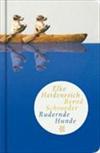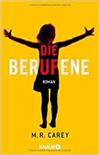It's a new month... time for some new bug fixes!
While Matt is still working on harnessing the book data that we all have contributed to, and making it available for searches, he's also been rather busy fixing other things, and even adding some nifty little features. Read all about it in this Announcements forum post.
Frankie and Stankie
by Barbara Trapido | Literature & Fiction | This book has not been rated.
ISBN: 0747568146 Global Overview for this book
ISBN: 0747568146 Global Overview for this book
1 journaler for this copy...
 Purchased at a garage sale in Forster for $2
Purchased at a garage sale in Forster for $2Paperback in good used condition
Picture is of the author
Review in The Guardian by Joanna Briscoe
The pressure upon an author to duplicate a winning formula can be intense. Barbara Trapido is adored, and over a 20-year career that has produced the likes of Brother of the More Famous Jack, Juggling and The Travelling Hornplayer, she has become one of that rare band whose next novel is awaited with impatience. Her fiction snares from the first page, its plot machinations skilfully veiling a darker pulse.
Frankie and Stankie (the title is taken from a childhood conceit) is her first true departure, and as such will doubtless upset fans hooked on the surface delights of her air-spun choreography. For others, it will more than confirm the gravitas that lay there all along, for Trapido possesses a thornier soul than some critics would suggest, and indeed her last novel, The Travelling Hornplayer, was her darkest to date.
Despair and bereavement have always underlined Trapido's satire-edged romance, but the true weight lies in her perceptions, in her ability to cut straight to the essence of things, however many cricket whites, teas, stringed instruments, trips to Italy and adolescent passions are there to soothe the senses. In Frankie and Stankie she lets her young heroine do the talking, but out of the mouths of babes comes a catalogue of atrocities.
Dinah de Bondt and her sister Lisa are growing up in late 1940s and 1950s South Africa as racial laws degenerate to the obscene. As white children with a mixed racial heritage and a politically dissenting family, they must find their place in a minutely stratified society. Dinah's subscription to the universal childhood ambition to be just like everyone else is counterbalanced by her own liberal sentiments: she's terrified that contemporaries will discover that her academic father fraternises with an Indian lawyer. Yet she is, she realises, "a weirdo", highly disturbed when a teacher "lets drop a cheery, unreviewed anecdote about having once seen South African Bushmen on display in a cage at Johannesburg's Rand Easter Show".
An almost invisible juggling act is accomplished as the world is presented from knee-height (the older female protagonist is referred to throughout as "Dinah's Mum", for example), while the larger picture is screened behind with newsreel clarity, the facts laid down with a coolness that drives the horrors home.
Dinah, a fragile blonde asthmatic, "premature and anaemic and sub-standard", attends a Durban girls' school where every pupil is drilled in the codes of prejudice: "Every child has a story about how one day their mother went out and came back home to find that the native girl was drinking out of one of the family's china teacups. Ughh! The native girl always gets the sack if she's caught and it serves her right." A neighbour refers to her maid as "the savage", and the Immorality Act requires policemen to "sniff at post-coital bedlinen" for proof of illicit interracial copulation.
In the meantime, "koelies (Indians) are a plague in our midst. The girls talk about koelies as if they were like cockroaches. Squash them and they're yellow inside." At Dinah's school, "Aletta is probably the girl in the class who dislikes natives most and she holds her nose just that much longer... when a Zulu gardener passes the classroom window... But everyone already knows that natives smell, so they aren't at all impressed." After the Afrikaner Nationalists win the election and tighten up the race laws, Aletta herself is racially reclassified and removed from school.
In the first few chapters a sense of bemusement dominates as the reader waits for Trapido's plot pyrotechnics to begin. They never arrive - and it is this which will sharply divide opinion. The book obeys none of the narrative conventions of a novel, and in that sense, it frustrates; yet if all expectations of a page-turning Byzantine plot are abandoned, and the clearly highly autobiographical Frankie and Stankie is read instead as a memoir, as a beautifully written slice of both personal and political history, then it forms a remarkable document with a narrative drive of its own.
We are in the era of breathtakingly sadistic teachers, of callipers, polio and iron lungs, of liquid paraffin, Syrup of Figs and cock-a-leekie soup, a world of gingham, tapioca and rick-rack braid. To an English reader, the familiar is fascinatingly interwoven with the alien. Among the flame trees and banana palms, Union Jacks are planted in the flowerbeds, and "home-time on the Berea can look like the Henley Regatta", while the girls lust after "a precious, faggoty English public schoolboy look, complete with washboard chest and Rupert Brooke profile". This is also a country of gun-happy Afrikaner farmers: "shooting is a popular hobby... occasionally the farmers shoot their own wives or their children by mistake, and then it gets into the papers. Sometimes they'll shoot the black housemaid who's coming in with the morning tea, because they think she's an intruder."
As ever, Trapido is at her best when describing the intensity of adolescence. Lisa, Dinah's older sister, strangely is never fully delineated as a character, unlike her memorable friends and lover, but the fabulous Dinah will dedicate several hours to literary criticism of a single issue of Vogue, and at a ball "sits, waiting for the elegant mating dance of literary-verbal interplay, where her partner's intent will merely be to deposit saliva inside her mouth". Love in the time of apartheid is a complicated matter. As a student during the state of emergency, Dinah is caught between the loveless dating rituals of the era and romance with a politically active history lecturer who never knows when the Special Branch will visit.
A belief in true, glorious, heartstopping love is a Trapido trademark, and here the moment of epiphany when Dinah meets her man is transcendent: the arch satirist, even at her edgiest, bathes the reader in the glow of her philanthropy, so that by the end of the novel, you are immersed in her world and simply never want to leave it. Frankie and Stankie is indeed, as Dinah says of Pride and Prejudice, "real life, but all transfigured, and dancing in a box".







